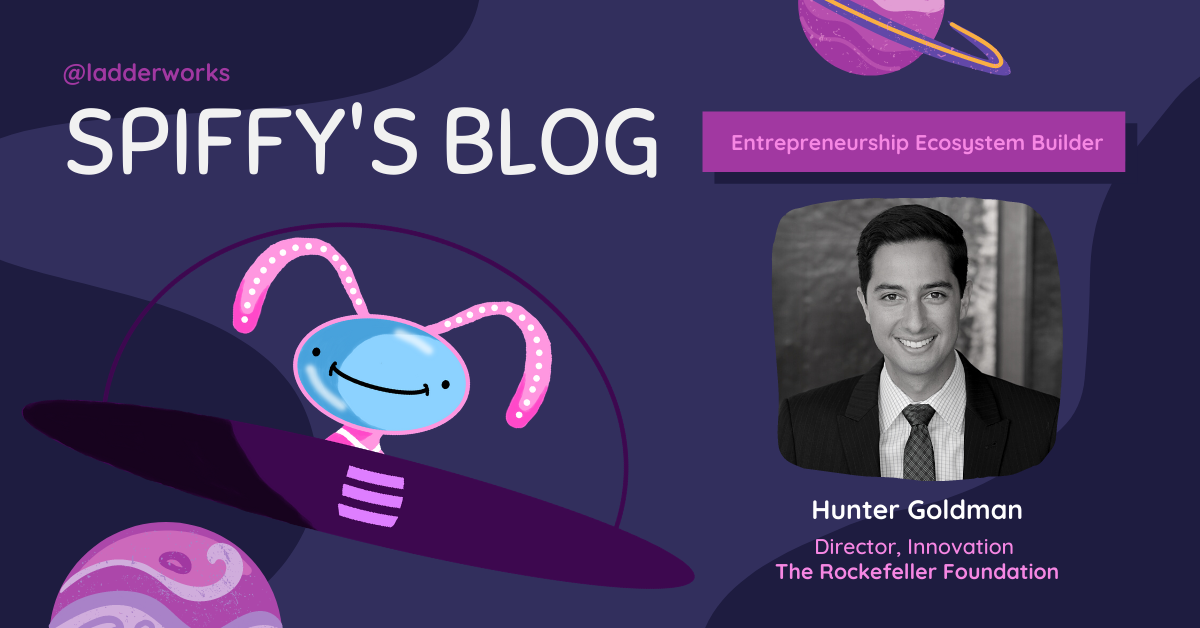Hunter Goldman: Using Innovation to Meet Global Challenges
 Hi folks! I’m Spiffy, your interplanetary journalist reporting from Planet Earth, back with a new guest committed to making a difference in the world through innovation. Hunter Goldman is the Director of the Innovation team at The Rockefeller Foundation. Are you ready to be inspired?
Hi folks! I’m Spiffy, your interplanetary journalist reporting from Planet Earth, back with a new guest committed to making a difference in the world through innovation. Hunter Goldman is the Director of the Innovation team at The Rockefeller Foundation. Are you ready to be inspired?
Spiffy: Hi Hunter! Thanks for meeting with me! Let’s jump right in. Can you tell me what challenges you are addressing through your work at The Rockefeller Foundation?
Hunter: Thanks so much for having me, Spiffy. The Rockefeller Foundation’s mission has remained unchanged for over 100 years—to improve the well-being of humanity. We believe in the power of evidence-informed decisions to improve social outcomes for all people, regardless of where they live, so that they have equal access to opportunity amid a transition to a modern digital, environmentally stable economy. As Covid-19 upended so many lives this past year, we pivoted our strategic focus to two "moonshot" efforts: (1) pandemic response and preparedness and (2) distributed renewable energy access for a green equitable recovery. The Innovation team works across the Foundation's different programs to apply its capabilities in data science and convenings to accelerate the impact of our work.
Spiffy: What would you say really motivates you to improve the lives of human beings?
Hunter: The crisis of this past year only highlighted the disparities in our communities and the need for paradigm shifts to think about and build what should become a new normal. Working on an innovation team at a philanthropic foundation has afforded me the privilege to think outside the box about how to work across different sectors and how to incentivize collaboration among different types of partners to rebuild communities in a more inclusive and equitable manner. For me personally, I remain motivated because my personal values are aligned with the mission of my organization and I can actively contribute by helping identify the actions we need to take in order to recover as a stronger society.
Spiffy: I see! And how would you say you are helping to make the world a more equitable place through your work?
Hunter: Well, Spiffy, given both the near term response challenges to Covid-19, and the long term growth challenges we are bound to face as the immediate crisis wanes, my organization has prioritized two "moonshot" efforts that we hope leads to a more equitable world. These include (1) our initiative to catalyze a recovery from the Covid-19 crisis that delivers a more equitable and sustainable recovery and helps guard against future pandemics and (2) our initiative to incentivize a global push for distributed renewable energy access as a means of laying the foundations for a green transition.
Spiffy: Can you fill me in on any recent milestones you’ve witnessed in your work?
Hunter: On the Innovation team where I sit, one of the capabilities we aim to build among our partners is helping them leverage data science to accelerate their missions. In early 2020, alongside the MasterCard Center for Inclusive Growth, we launched data.org as a platform for partnerships to build the field of data science for social impact. We work with organizations from all over the world to increase the use of data science in order to improve the lives of millions of people. This is best illustrated through the Inclusive Growth and Recovery Challenge where last year data.org awarded $10 million to eight organizations that will tackle society’s greatest challenges by harnessing the power of data science to help people and communities thrive.
Spiffy: I’m curious if there is a project you’ve worked with that really exemplifies the impact you’re striving to make?
Hunter: As an Innovation team working across multiple sectors within the broader global development community, we occasionally come across cross-sectoral challenges that we believe ourselves to be in a prime position to address. One of those challenges that has emerged in recent years has been that organizations working on the ground in emerging markets often desire access to geospatial data and remote sensing analytical capabilities in order to enhance their ability to deliver on their respective missions. As a result, we incubated a startup called AtlasAI that has built software to measure economic and infrastructure conditions across Africa, informing how capital can be deployed to drive forward economic progress.
Spiffy: It sounds like there is so much potential for action and innovation, Hunter! Thanks for taking the time to tell me about your inspiring role at The Rockefeller Foundation. It’s been an honor!
Hunter Goldman is a Director on the Innovation team at The Rockefeller Foundation, where he manages strategic partnerships and programs that leverage capabilities in data science, convenings and networks, and research to accelerate the impact of the Foundation's work. Prior to Rockefeller, he was a consultant for The Omidyar Network. Hunter received his Master of International Affairs from Columbia University in economic and political development and a BA from New York University. (First published on the Ladderworks website on June 4, 2021.)
© 2021 Ladderworks LLC. Edited by Jill Landis Jha. Spiffy’s illustration by Shreyas Navare. Follow Spiffy’s interviews of founders building a more equitable world here.


